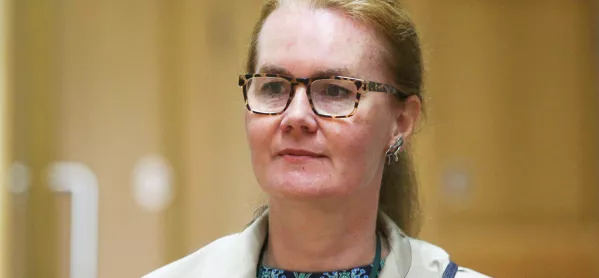SQA chief: No new qualifications body before 2025

Next year’s exams were supposed to be the last overseen by the Scottish Qualifications Authority - which the government committed to replacing in the wake of the 2021 review of Curriculum for Excellence.
However, in June the new education secretary, Jenny Gilruth, said she was delaying reform of the SQA and Education Scotland by a year to take into account “four substantive reports” that had been published “within four weeks”, as well as to “hear from the profession about the outputs of those reviews”.
Now, at a meeting of the Scottish Parliament’s Education, Children and Young People Committee, the new timeline that the Scottish government is working to has emerged.
And it has been made clear to MSPs that these plans could also be derailed, given that they depend “on the passage of the legislation through Parliament”.
- Background: Education reform paused “to hear from teachers”
- Related: Seven key messages as Hayward report on assessment unveiled
- SQA reform: Key proposal rejected by government
SQA chief executive Fiona Robertson said: “There will not be a new qualifications body before 2025, so that’s a considerable period of uncertainty.”
She said the expectation is now that there will be a new qualifications body “in place by the autumn of 2025”, and that body “will oversee the qualifications in 2026”. But she added that sticking to the new timeline “depends on parliamentary process”.
Ms Robertson said: “It depends on the passage of the legislation through Parliament, and the implementation of any legislation that follows, but if all goes to plan…a new body will be in place by autumn 2025.”
SQA faces difficulties amid uncertainty
Giving evidence to the committee this morning, Ms Robertson also set out the challenges that the SQA is facing in terms of being able to recruit “the best possible people” amid all the uncertainty.
She criticised the government’s failure to clarify in 2021 “for a period of five or six months” that there would be no compulsory redundancies as a result of the plans to replace the SQA. She said that had led to the body losing talented staff, and that it still remained “harder to recruit”.
Ms Robertson said: “I think it’s important for me to highlight that it did take, unfortunately, a number of months for ministers to confirm that there would be no redundancy - so that jobs were safe. I think that did impact and I think we did see an increase in turnover and we did lose some people that we would not have wished to have lost from the organisation. And not only that, I think, in that context, it can be harder to recruit. It can be hard to recruit to an organisation when the organisation is not going to exist.”
Gill Stewart, the SQA’s director of qualifications development, meanwhile, told the committee that staff morale continued to be impacted by the uncertainty surrounding the organisation’s future and how people’s roles might change.
She also said that there was frustration coming from those in her directorate, in particular, because there had been no government response to key reports on the future of qualifications - including Professor Louise Hayward’s independent review of assessment and qualifications, which reported in June.
Dr Stewart said SQA staff wanted “to make changes to the qualifications to improve” but could not.
Ms Robertson was asked for her views on the final report of the Hayward review, which recommended removing exams in S4 and introducing a Scottish Diploma of Achievement (SDA) to capture a wider range of achievement - including allowing students to record information about their personal interests.
Ms Robertson described the report as “a substantive report” that suggested “potentially some very considerable changes to our education and skills system”. She said the proposals would need to be “very carefully thought through”. In particular she said that “equity” would need to be considered when it came to the “personal pathway” aspect of the proposed Scottish Diploma of Achievement.
Concerns have been raised that students from more affluent backgrounds with more access to extracurricular activities could be at an unfair advantage when it comes to this aspect of the SDA - although Professor Hayward has said that if the proposals are taken forward, there should be “learner entitlements to ensure that all learners have appropriate opportunities”.
Ms Robertson also said concerns about workload implications stemming from the proposals would have to be addressed - she said it is about “capability”, as well as capacity - and the right technology would have to be put in place “to truly make this a success”.
Speaking in the Scottish Parliament in June, Ms Gilruth said that now was “not the time to introduce legislation on educational reform” and that she was “determined to take the time needed to ensure” any reform was “bold and holistic” and “shaped by the expertise of our teachers”.
She said that was why she had decided “to pause” education reform for a year but she said that she still intended to “legislate to remove the SQA”
At the time the EIS teaching union said secondary teachers would be “angered and dismayed” by the news and it was difficult to see how upper secondary could be reformed “confidently and competently” with the SQA intact.
You need a Tes subscription to read this article
Subscribe now to read this article and get other subscriber-only content:
- Unlimited access to all Tes magazine content
- Exclusive subscriber-only stories
- Award-winning email newsletters
Already a subscriber? Log in
You need a subscription to read this article
Subscribe now to read this article and get other subscriber-only content, including:
- Unlimited access to all Tes magazine content
- Exclusive subscriber-only stories
- Award-winning email newsletters
topics in this article



